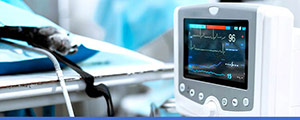Long QT Syndrome Treatment in East Bridgewater, MA
Long QT Syndrome (LQTS) treatment aims to control symptoms and avoid potentially fatal arrhythmias. The symptoms of long QT syndrome primarily include episodes of fainting, known as syncope, which occur when the heart’s rhythm becomes irregular. These fainting spells can be triggered by various factors such as stress, excitement, anger, or physical exertion. Having routine check-ups with our board-certified Dr. Akash Patel, MD is crucial for condition monitoring and necessary treatment adjustments. Long QT syndrome treatment is available at Nova Medical Group. For more information, please contact us or schedule an appointment online. We are conveniently located at 401 N Bedford St, East Bridgewater, MA 02333.


Table of Contents:
What is long QT syndrome?
What causes long QT syndrome?
What are the symptoms associated with long QT syndrome?
How is long QT syndrome diagnosed?
How is long QT syndrome treated?
Long QT syndrome is a medical condition that affects the heart’s electrical system which causes the heart to take longer than normal to recharge between beats. This interval is called the QT interval, and it is visible on an electrocardiogram (ECG).
When this interval is longer than usual, it is capable of leading to fast and irregular heartbeats, potentially resulting in serious health issues like fainting and seizures. Long QT syndrome can be present from birth or can develop later in life, requiring continuous management to prevent severe complications.
The abnormal electrical activity in the heart can cause sudden, chaotic heartbeats, which can lead to fainting, seizures, or even sudden death. The syndrome can be either congenital, meaning it is inherited and present from birth, or acquired, developing due to external factors such as medication or other health conditions. Regardless of its origin, long QT syndrome requires careful monitoring and treatment to manage its risks.
Congenital long QT syndrome is inherited and results from mutations in genes that affect the ion channels in the heart. These ion channels are responsible for the electrical signals that regulate the heart’s rhythm. When these channels do not function correctly, it can lead to a prolonged QT interval and arrhythmias.
Family history plays a significant role in congenital long QT syndrome, with individuals who have relatives with the condition being at higher risk. Acquired long QT syndrome, on the other hand, is not inherited but develops due to external influences.
This form of the syndrome can be triggered by underlying health conditions, medication uses, and other factors. Drugs such as antibiotics, antifungals, heart rhythm medications, and mental health drugs are known to prolong the QT interval. Health conditions like electrolyte imbalances involving potassium, calcium, or magnesium can also lead to acquired long QT syndrome.
The symptoms of long QT syndrome primarily include episodes of fainting, known as syncope, which occur when the heart’s rhythm becomes irregular. These fainting spells can be triggered by various factors such as stress, excitement, anger, or physical exertion.
Prior to fainting, individuals may experience warning signs like lightheadedness, blurred vision, heart palpitations, and weakness. In more severe cases, long QT syndrome can cause seizures due to the abrupt and erratic heartbeats that interfere with the brain’s electrical activity. For those with congenital long QT syndrome, symptoms often begin sometime before the age of 40. However, some individuals may not show any symptoms and may be diagnosed during routine heart examinations or genetic tests.
In cases of acquired long QT syndrome, symptoms can appear at any age, depending on the triggering factors. These symptoms can also occur during sleep, adding to the unpredictability of the condition. Early recognition and diagnosis are essential to manage and mitigate the risks associated with long QT syndrome.
Diagnosing long QT syndrome involves a combination of clinical evaluation, family history assessment, and specific diagnostic tests. The main diagnostic tool that is used is the electrocardiogram (ECG), which measures the QT interval.
A QT interval longer than usual may indicate long QT syndrome. Patients at Nova Medical Group will undergo a thorough review of their medical and family history, looking for instances of fainting, seizures, or sudden cardiac arrest, which can suggest the presence of long QT syndrome.
Additional diagnostic tests may include genetic testing to identify inherited forms of the condition. Blood tests can also check for electrolyte imbalances that may prolong the QT interval. Ambulatory monitors, which track the heart’s activity over 24 hours or longer, and exercise stress tests can provide further insights into the heart’s electrical behavior under different conditions.
Treatment for long QT syndrome will depend on the individual patient’s specific needs, based on whether the condition is congenital or acquired and the severity of the symptoms. For those with acquired long QT syndrome, addressing the underlying cause, such as discontinuing a problematic medication or correcting an electrolyte imbalance, can be effective. Medications like beta-blockers are commonly prescribed to help stabilize the heart’s rhythm.
Surgical options may also be considered for some patients, such as left cardiac sympathetic denervation, which helps reduce the risk of life-threatening arrhythmias.
Alongside these medical treatments, lifestyle modifications are essential. Patients are advised to manage stress, avoid overexertion, and be cautious with activities that could trigger symptoms.
Long QT syndrome treatment is available at Nova Medical Group. For more information, please contact us or schedule an appointment online. We are conveniently located at 401 N Bedford St, East Bridgewater, MA 02333. We serve patients from Bridgewater MA, Abington MA, Brockton MA, West Bridgewater MA, Easton MA, Taunton MA, Raynham MA, and the surrounding areas.


Additional Services You May Need
▸ Urgent Care
▸ Primary Care
▸ Women’s Health
▸ Weight Management
▸ Diabetes Management
▸ High Blood Pressure
▸ Sports Medicine
▸ Specialty Services
▸ Occupational Health
▸ Adult Primary Care
▸ Pediatric Primary Care
▸ Geriatric Primary Care
▸ Fractures/Burns/Cuts
▸ Annual Physicals
▸ Hereditary Cancer Risk





